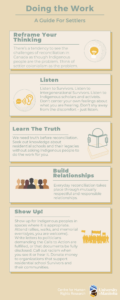By Pauline Tennent
Resources for non-Indigenous Canadians on residential schools and colonialism in Canada
Canadians, now more than ever, must act with intention to acknowledge the harmful legacies of the Residential School System and its ongoing impact on Indigenous peoples and communities. Many non-Indigenous Canadians may feel lost on where to start this learning journey. With this in mind, the Centre for Human Rights Research, in collaboration with the National Centre for Truth and Reconciliation hosted a panel discussion with more than 160 people from across Canada where we answered your pre-submitted questions on residential schools and the impact of colonialism in Canada.
 Our discussion was guided by Elder Betty Ross from Pimicikamak First Nation and Knowledge Keeper Clayton Sandy from Sioux Valley Dakota First Nation. Panelists included non-Indigenous (or settler) historians, educators and information professionals who have worked for many years on issues relating to residential schools and colonialism in Canada. Panelists included Dr. Sean Carleton and Dr. Andrew Woolford from the University of Manitoba; Dr. Erin Millions from the University of Winnipeg; Dr. Brian Gettler from the University of Toronto; and Monique Woroniak from the City of Winnipeg. The Director of the Centre for Human Rights Research Dr. Adele Perry chaired this important discussion.
Our discussion was guided by Elder Betty Ross from Pimicikamak First Nation and Knowledge Keeper Clayton Sandy from Sioux Valley Dakota First Nation. Panelists included non-Indigenous (or settler) historians, educators and information professionals who have worked for many years on issues relating to residential schools and colonialism in Canada. Panelists included Dr. Sean Carleton and Dr. Andrew Woolford from the University of Manitoba; Dr. Erin Millions from the University of Winnipeg; Dr. Brian Gettler from the University of Toronto; and Monique Woroniak from the City of Winnipeg. The Director of the Centre for Human Rights Research Dr. Adele Perry chaired this important discussion.
We received many insightful questions from across the country. There were a number of questions asking specifically about the operation of the residential school system, such as how to find where residential schools were located or the role of the RCMP in the residential school system. We also had questions from individuals who were looking to learn more about the experiences of Survivors at residential schools. Others submitted questions focused on how the legacies of the residential school system impact life in Canada today — including the child welfare system. In answering all of these questions, panelists were in agreement that as a society, we need truth before reconciliation. And that means that non-Indigenous people have to do the work — to listen and to learn.
Many of the questions we received also highlighted how parents were trying to grapple with Canada’s complex history and contribute in some small way to reconciliation beginning with their families. Panelists Erin Millions and Monique Woroniak emphasized the need for a family-centred approach, with parents and children learning together using age-appropriate resources, such as books and graphic novels. Erin and Monique recommend that resources should centre the experiences and voices of residential school Survivors. One such example is Sugar Falls, a graphic novel by David A. Robertson aimed at young people ages 14-18 years. This graphic novel shares the stories and experiences of Elder Betty Ross. A complete list of resources that our panelists recommend most can be found here!
One of the most frequent questions we received from individuals across Canada, young and old, was “as a settler what I can do to support and become a strong ally in this process of truth and reconciliation.” Reflecting on their own experiences of working towards truth and reconciliation in Canada, the panelists developed some key points that they believe can help other non-Indigenous peoples support the much-needed work of reconciliation in this country. This includes the need for non-Indigenous peoples to reframe their thinking, to listen, to learn the truth, to build relationships, and importantly to show up — to do the work! You can download a guide for settlers here!
Artist and author Kara Sievewright from Haida Gwaii graphically recorded the session in real-time, pulling out some of the key information that was part of the discussion.

If you are interested in viewing the full panel discussion, please see our YouTube page.
For more information, please contact the CHRR.

